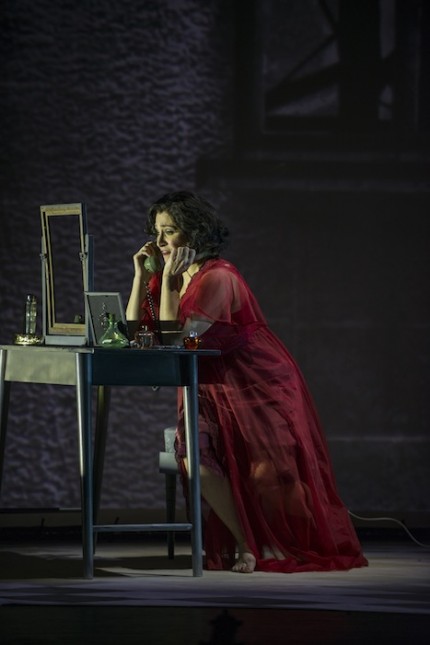Racette shines in COT’s mixed double bill
Though it likely wasn’t planned that way, Chicago Opera Theater’s double bill made a nice bit of Valentine’s Day counter-programming for romantic cynics. The scenario of Poulenc’s La Voix Humaine tells of a desperate woman who is unsuccessfully trying to salvage a love affair. And in Puccini’s Gianni Schicchi a pair of young lovers vies with a bevy of greedy relatives who can’t wait to get their hands on a dead uncle’s inheritance.
The second and final performance of COT’s offbeat double bill took place Sunday afternoon at the Harris Theater.
Big names have not been plentiful in the current COT era and Patricia Racette brought some welcome star power to Poulenc’s La Voix Humaine in the matinee’s first half.
The role of Elle, the sole character of Poulenc’s 1959 monodrama, is a good one for Racette at this stage of her career. Based on Jean Cocteau’s play of the same name, La Voix Humaine is a simple extended telephone conversation with her lover, as Elle segues from casual to desperation in trying to save the clearly foundering relationship.
The soprano brought characteristic dramatic sympathy to the role, carrying the quarter-hour monodrama as if in a single arc. She sang with exemplary French, fine tone and flexibility, starkly conveying the protagonist’s insecurity, regrets, psychic desperation and ultimate tragedy.
Conductor Ari Pelto was a full partner with Racette, drawing alert, tight support from the orchestra and bringing out the Gallic flavor and melancholy of Poulenc’s deft, effective score. The subdued gray and black apartment setting and unobtrusive direction by Andreas Mitisek provided a fine backdrop for Racette’s tour de force performance.
Comedy came after intermission with Gianni Schicchi, which offered more mixed rewards. Mitisek indulged his penchant for updating by setting Puccini’s farce in a 1970s Austin Powers-like milieu with outlandish period costumes and psychedelic projections.
Even that might have worked but Mitisek, unfortunately, encouraged the band of grasping relatives to overact frantically in an attempt to gin up the comedy. Once again, it’s the situations and skillful timing that make comedies work, not funny costumes or frenzied mugging.
Worse still was the decision to perform Schicchi in English. That may have given the punchlines greater immediacy but made for awkwardness in the brief lyrical moments that give this cynical piece a brief ray of humanity.
As Lauretta, Emily Birsan sang the celebrated “O mio babbino caro” with pure tone and feeling yet the unwieldy English translation (“Oh, Daddy dear, please I love him”) didn’t do her any favors. Nor did the premature applause, from Sunday’s unusually gustatory audience.
As the title shyster trickster who outwits the greedy relatives, Michael Chioldi sang with a big if hoary baritone. He was an energetic presence and certainly alive to the comedy, garbed in bad 70s wig and cool/uncool period Italian glasses.
As Lauretta’s beloved Rinuccio, Christopher Tiesi displayed an ardent tenor, and was a bright spot amid most of the overcaffeinated cast. Pelto conducted the score impressively, conveying the wit of Puccini’s writing as well as giving lift to the fleeting lyrical moments.
Posted in Performances





